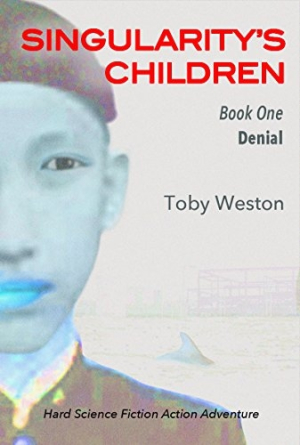
Denial
Singularity's Children, Book 1
There’s plenty of food for thought in this swift, fast-paced dystopia with recognizable fragments of our own world.
Denial, the first volume of Toby Weston’s Singularity’s Children series, delivers a razor-sharp view of Earth’s future, a tomorrow-land as disturbing as it is utterly plausible.
In a postapocalyptic world, governments are ineffectual, work has become a rare and prized commodity, and the middle class has vanished along with most of Western civilization and anything resembling an infrastructure. The wealthy one percent of the one percent live in walled enclaves, while those lucky enough to have careers enslave themselves to unsavory corporations, and everyone else scrambles to survive.
Each locked social strata is glimpsed through the book’s central characters: Niato, scion of the world’s wealthiest family; Stella, who lives with her drug-addled mother on a floating garbage-heap of a tuna farm in the Pacific; unemployed Anosh, who, with his wife and children, manages to recapture some of life’s former sweetness; and Keith, a wage slave who’s begun to wonder if the perks of his job are worth the moral and emotional price he’s paying. Chapters move from character to character to show how each strata functions, with human beings both good and bad cobbling together the rudiments of a social structure. Gradually threads are revealed that, deep beneath the surface, link the characters together.
The characters throughout are compelling and vividly drawn, and the author anticipates humanity’s reaction to the new normal with the same keen eye used to foresee the greater world. There are no heroes or villains here, just people struggling to survive as best they can.
As dystopian world-building goes, the book is a tour de force—sophisticated, richly detailed, and believable. No need to blame asteroids or nuclear war for the catastrophe that left the world in shambles—the seeds of destruction are on display in our own world. Unsustainable debt prompts governments to wipe the slates clean by printing vast amounts of money, triggering hyperinflation and global financial collapse. Without money, production grinds to a halt, leaving shreds of technology behind to be rebuilt, refurbished, tweaked, and traded.
Denial is a swift, fast-paced read, but by no means a lightweight one. Jam-packed with ideas, images, and recognizable fragments of our own world, there’s plenty of food for thought. Deftly sketched images are worth savoring: a “wad of approaching air” heralds the arrival of a train in a metro station; public spaces are smeared with graffiti dedicated to a gang lord on a popular alternative-reality soap opera; America, reeling from a second civil war and no longer a world power, has become “a perpetual hillbilly cannibal cook-off.”
Fans of dystopian fiction, older teens, and those who wonder just where the more troubling aspects of our present could lead will not be able to put this book down, and will eagerly await the next installment of Singularity’s Children.
Reviewed by
Susan Waggoner
Disclosure: This article is not an endorsement, but a review. The publisher of this book provided free copies of the book and paid a small fee to have their book reviewed by a professional reviewer. Foreword Reviews and Clarion Reviews make no guarantee that the publisher will receive a positive review. Foreword Magazine, Inc. is disclosing this in accordance with the Federal Trade Commission’s 16 CFR, Part 255.
